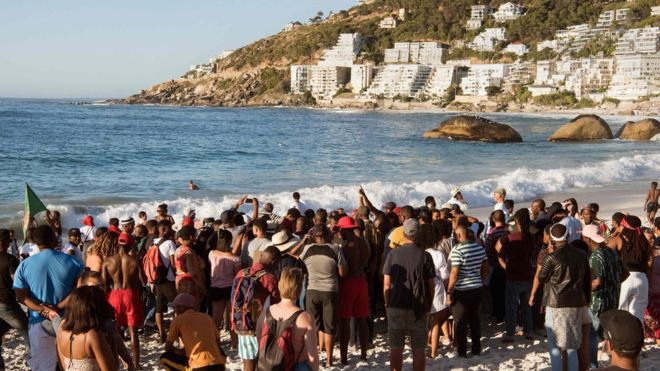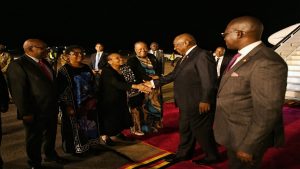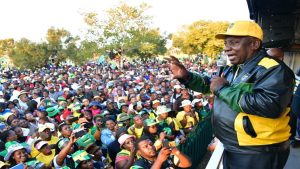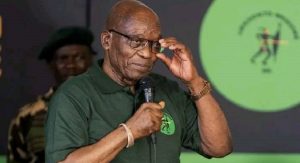On the eve of Reconciliation Day, people in Bergville in the KwaZulu-Natal midlands say reconciliation is a dream deferred.
The official government event marking the day takes place in the area where locals say racial tensions persist. President Cyril Ramaphosa is expected to deliver the keynote address on Monday.
Unemployment and poverty remain high among the locals. They make a living by selling fresh produce and livestock.
Many have been victims of racially-motivated land dispossession in 1913.
The AmaNgwane clan is the dominant tribe in the area led by its Chief Menzi Hlongwane. He says they want the white farmers to return their land.
“They must go, they must just go. They must move to the cities and open up firms and let our people cultivate the land as a nation. Planting on this land is what we’ve always done. Our people don’t have farms. All the farms in this area are owned by white people. 250 000 hectares are white-owned in this land belonging to the Ngwane clan was taken. There is no reconciliation in this community. President Cyril Ramaphosa must intervene in getting our land back.”
LGBTI community still live in fear
The Lesbian, Gay, Bisexual, Transgender, Intersex and Queer-Plus (LGBTQ+) community says it still faces marginalisation despite constitutional recognition.
With an increase in “corrective rape” cases and other assaults targeted at LGBTIQ+ members, they say they continue to live in fear, 25 years on.
An LGBTI activist, Thabiso Mogapi, says he discovered he was gay when he was 23.
“My name is Thabiso Mogapi, an LGBTI activist also a gay person. I don’t want to say I came out, it’s just that I discovered myself when I was around 23 years of age.”
Mogapi is one of the many South Africans living openly as homosexual. Mogapi says despite calls for South Africans to reconcile and unite under the banner of Reconciliation Day, members of his community still face stigma, particularly in rural areas.
“It’s one challenge where are community is challenged and is not recognised and their rights are not respected. The traditional leaders, the traditional council and the community at large, they still don’t respect their rights and they still do not recognise their existence within the community. How do we reconciling as the LGBTI and a village community?”
Rights of same-sex couples
Day of Reconciliation was celebrated as a public holiday for the first time in 1995. In December 2005, South Africa became the fifth country in the world, and the first on the African continent, to recognise the rights of same-sex couples.
But the LGBTIQ+ community says despite these policy changes, and the country’s reconciliation processes, couples in same sex marriages and LGBTIQ+ community members are still discriminated against. They say they will only feel part of a united and reconciled South Africa if hate crimes and violence against them are stopped.
“I personally do not see us near reconciling. Maybe that reconciliation is there somewhere else, but really South Africans seem to be selective, particular when it comes to us as LGBTI community.”
With efforts made to engage various communities, particularly in rural areas under traditional leadership, concerned members of the LGBTIQ+ community say more still needs to be done to recognise and reconcile with an ever-changing society.
#ImStaying
However, a social media page calling itself #ImStaying believes social media can have a positive role in bridging historical gaps.
Many South Africans have taken to social media to share stories of patriotism. Creators of the recently-established hash-tag say social media can have a positive influence in shifting the narrative from political, cultural, racial and religious intolerance to unity.
The social media public group, #ImStaying was published on Facebook in September.
The movement’s overall goal is to create a social media tool, where South Africans from different backgrounds and cultures are able to engage.
In less than four months, it has become one of the most visible public groups.
Founder Jarred Petzer says they are hoping to give members a platform to voice their patriotism.
“The reason why the group was started was to start changing the narrative in South Africa because there was a heavy focus on politics. There was a heavy focus on all the stuff that was going on in the country and we wanted to sort of start focusing on things in South Africa that we could aspire towards or be positive about and that was basically the gist of what got us going. Then the group started to take shape. It is amazing how people started submitting their stories and really started to transcend barriers.”
Since its inception, its membership has increased exponentially. Almost one million people across all racial groups, religious affiliations and cultures have joined the group.






